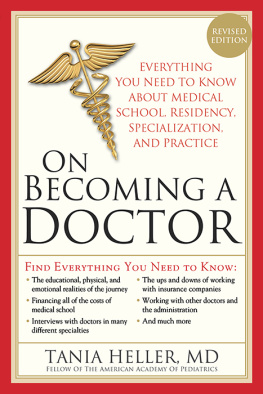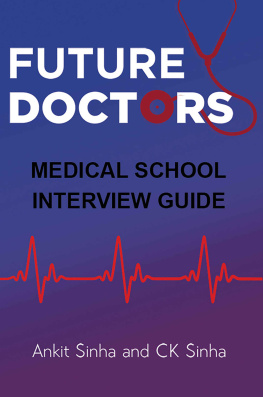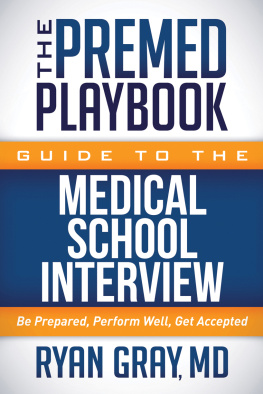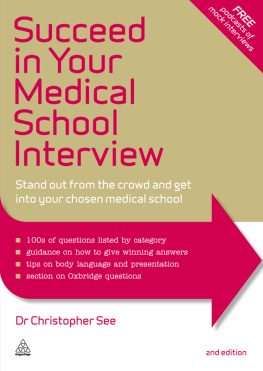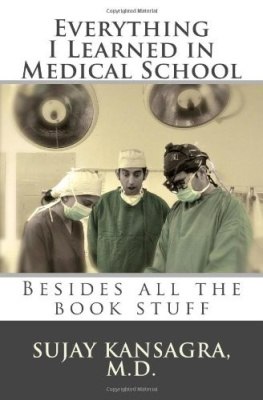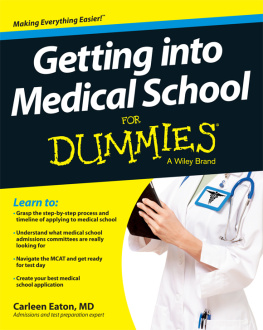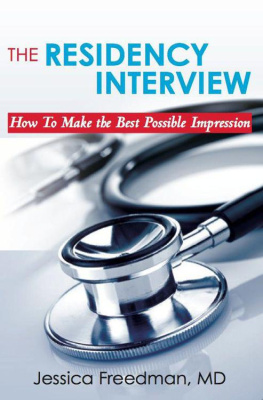Sujay Kansagra - Why Medicine?: And 500 Other Questions for the Medical School and Residency Interviews
Here you can read online Sujay Kansagra - Why Medicine?: And 500 Other Questions for the Medical School and Residency Interviews full text of the book (entire story) in english for free. Download pdf and epub, get meaning, cover and reviews about this ebook. year: 2012, publisher: Createspace Independent Publishing Platform, genre: Science. Description of the work, (preface) as well as reviews are available. Best literature library LitArk.com created for fans of good reading and offers a wide selection of genres:
Romance novel
Science fiction
Adventure
Detective
Science
History
Home and family
Prose
Art
Politics
Computer
Non-fiction
Religion
Business
Children
Humor
Choose a favorite category and find really read worthwhile books. Enjoy immersion in the world of imagination, feel the emotions of the characters or learn something new for yourself, make an fascinating discovery.

- Book:Why Medicine?: And 500 Other Questions for the Medical School and Residency Interviews
- Author:
- Publisher:Createspace Independent Publishing Platform
- Genre:
- Year:2012
- Rating:3 / 5
- Favourites:Add to favourites
- Your mark:
- 60
- 1
- 2
- 3
- 4
- 5
Why Medicine?: And 500 Other Questions for the Medical School and Residency Interviews: summary, description and annotation
We offer to read an annotation, description, summary or preface (depends on what the author of the book "Why Medicine?: And 500 Other Questions for the Medical School and Residency Interviews" wrote himself). If you haven't found the necessary information about the book — write in the comments, we will try to find it.
Sujay Kansagra: author's other books
Who wrote Why Medicine?: And 500 Other Questions for the Medical School and Residency Interviews? Find out the surname, the name of the author of the book and a list of all author's works by series.
Why Medicine?: And 500 Other Questions for the Medical School and Residency Interviews — read online for free the complete book (whole text) full work
Below is the text of the book, divided by pages. System saving the place of the last page read, allows you to conveniently read the book "Why Medicine?: And 500 Other Questions for the Medical School and Residency Interviews" online for free, without having to search again every time where you left off. Put a bookmark, and you can go to the page where you finished reading at any time.
Font size:
Interval:
Bookmark:
Why Medicine? And 500 Other Questions for the Medical School and Residency Interviews Also by Sujay Kansagra Everything I Learned in Medical School: Besides All the Book Stuff Why Medicine? And 500 Other Questions for the Medical School and Residency Interviews By Sujay M. Kansagra, MD Copyright 2012 by Sujay M. Kansagra WHY MEDICINE? And 500 Other Questions for the Medical School and Residency Interviews All rights reserved. No part of this publication may be reproduced or transmitted in any form without written permission from the author, except in brief quotations in literary reviews. Notice: The advice and medical information contained in this book are the opinion of the author. The author assumes no liability for any injury and/or damage to persons or property arising from this publication.
The author makes no guarantees of acceptance to medical school or residency after reading this book. ISBN-13: 978-1479286348 ISBN-10: 1479286346 For the students all over the world that know me as Dr. K. Contents Preface How to Use This Book Interviewing Tips The Questions Opening Questions Your Application You Character Patient Care Academics Teamwork If Questions Healthcare Policy/Current Events Questions Specific to the Medical School Interview Questions Specific to the Residency Interview Questions for the Older Applicant Questions You Probably Wont be Asked Random Questions Special Situations Medical Trivia/General Knowledge Closing Questions Questions You Can Ask Preface I vividly remember the interview process for medical school and residency. The process was long, arduous and expensive. It required hours of pasting a smile on my face and feeling as if someone was watching my every move.
But the process was also a chance to meet others that were in my shoes, a chance to travel, and a chance to connect. This was my opportunity to shine and show these institutions the true person behind the application. With each passing interview, I became more comfortable and confident. The reason was simple I felt prepared! The process of applying to medical school and residency can be challenging. However, with the right preparation, it can also be an enjoyable and rewarding experience. The purpose of this book is to help you with this preparation.
Good luck! Chapter 1 How to Use this Book The books layout is simple. In the following pages you will find question after question. These are some of the most common questions that I encountered as an interviewee and asked as an interviewer. Notes and thoughts can be written in the space provided after each question. You should not write out entire answers! The trick to interviewing is being prepared with answers but not sounding rehearsed. This can be difficult.
The best strategy is to develop some thoughts for each question but not memorize entire answers. You will undoubtedly come across many questions that are not covered here. However, most questions along the interview trail become repetitive and can be anticipated. Ive put these questions in this book. Please realize that there are no answers in this book! The reason is simple: The answers should come from you. You should not simply regurgitate responses that you believe people want to hear.
The entire purpose of the interview is for institutions to get to know you and determine if you are a good match for their program. They should be hearing your thoughts, not someone elses. Where appropriate, I have offered guidance on how to frame your answer. The actual answers should come from you. Chapter 2 Interviewing Tips Tip 1: Know your application You will quickly discover that the majority of questions will be about your application. This works in your favor since you should know your application better than anyone else.
Always keep a copy of the application with you and review it the night before your interview. Recall the type of work you did for each extracurricular activity. This is especially true for research. Never be caught saying, I only cleaned the test tubes. Even if you just did manual labor, you should know the type of research the laboratory performed and their goals. Not knowing the details behind your activities is a major red flag and tells the interviewer that you participated superficially just to write it on your resume.
Tip 2: Know the location I made it a habit to drive to the hospital the night before my interview so I knew exactly where I was going. Knowing the directions takes one stress away from what will already be a stressful day. Never trust Google Maps or your GPS. See it for yourself! Tip 3: Time should be on your side Nothing gets the interview day off to a worse start than running late. It creates stress for you, and if you do show up late, hurts your chances of acceptance. Instead, plan to get there 30 minutes earlier than scheduled.
If you are there early, walk around or read over your application. Time should be your friend during the interview process. Tip 4: Dress the part The interview trail is not the place to experiment with the latest in fashion. Stick with the convention. For females, a suit is the norm with the skirt suit being the most common. A pant suit is perfectly acceptable.
If you go with a skirt, make sure it is the appropriate length (to the knees). For men, a suit is a must. The colors for males and females are similar stick with navy blue, black or grey. Steer clear of excessive perfume and cologne. They should remember you for what you said and not how you smelled. Tip 5: Keep talking The key to a successful interview is staying loose.
I forced myself to make conversation with my fellow interviewees and talked about neutral topics that had nothing to do with the interview process. This was a great way to stay relaxed. Sitting in a corner by yourself and thinking about the upcoming interview may have the opposite effect. Tip 6: Be honest You have probably heard this advice countless times. The best way to ruin your chances of being offered a spot in a program is to lie. In addition, nothing gets you more nervous during an interview than stretching the truth.
Not to mention that you are about to embark on a career path where your integrity and character mean everything. Stick with the truth. THE QUESTIONS Chapter 3 Opening Questions Tell me about yourself. Where are you from? Do you know anyone in this area? What got you interested in our institution? Where else are you applying? Have you already interviewed at these places? Can you summarize your application for me? Be succinct. You dont have to mention all of your accomplishments. You should never talk for more than one minute at a time.
Therefore, hit the highlights and then give the interviewer the opportunity to ask more questions. The interview should feel like a conversation. What do you know about our school? What have you seen so far? It always impressed me as an interviewer when candidates remembered what they had seen on the tour and the interviewers they had already met. It showed me that they were interested. If you only had ten seconds to sell yourself, what you would say? Why medicine? This is a very common question. You can expect to hear this everywhere.
Everyone says some variation of, I like people and I like science. Try to be a little original. Personal stories are a plus. Chapter 4 Your Application Tell me about ____ (fill in the blank with an activity from your application). Questions regarding activities from your application tend to be the most common questions. Anything from your application is fair game.
Know your application well! Which extracurricular activity are you most proud of? Which activity took up most of your time? Which activity was the most rewarding? Which activity did you dislike and why? What was your last volunteer activity? How did you choose your extracurricular activities? How did you have time to do so many activities? The hidden question here is, Did you participate superficially to bulk up your application? When this came up, I emphasized that I had diverse interests and that I managed my time well. Why did you participate in so few activities? If this question comes up, emphasizing the extent of your involvement with your activities is important. Interviewers should appreciate quality involvement over quantity. Do you plan on staying involved with any of these extracurricular groups in the future? Did you take on leadership roles in any of your activities? If you didnt have an official title in your activities, you can still mention specific projects or tasks in which you took the lead. Which activities got you interested in medicine? How have your experiences contributed toward preparing you for a career in medicine? Did any of your activities involve direct patient contact? Which activity do you truly feel made an impact on someone else? Which activity had the biggest impact on you? Tell me about some of your activities that had nothing to do with medicine. Is there something from your application that you want to highlight? How did you decide on your topic for the personal statement? How well do you know the people that wrote your recommendation letters? How did you choose the people that wrote your recommendation letters? Have you had a chance to read any of your recommendations? If so, do you feel they are accurate? What honor/award are you the most proud of? Why? Which honor/award did you work the hardest to achieve? Are there any honors that you feel you didnt deserve? Are there any honors you did not receive that you feel you should have? Did you have any work experience while in college? It is perfectly acceptable to not have any paid work experience.
Next pageFont size:
Interval:
Bookmark:
Similar books «Why Medicine?: And 500 Other Questions for the Medical School and Residency Interviews»
Look at similar books to Why Medicine?: And 500 Other Questions for the Medical School and Residency Interviews. We have selected literature similar in name and meaning in the hope of providing readers with more options to find new, interesting, not yet read works.
Discussion, reviews of the book Why Medicine?: And 500 Other Questions for the Medical School and Residency Interviews and just readers' own opinions. Leave your comments, write what you think about the work, its meaning or the main characters. Specify what exactly you liked and what you didn't like, and why you think so.

